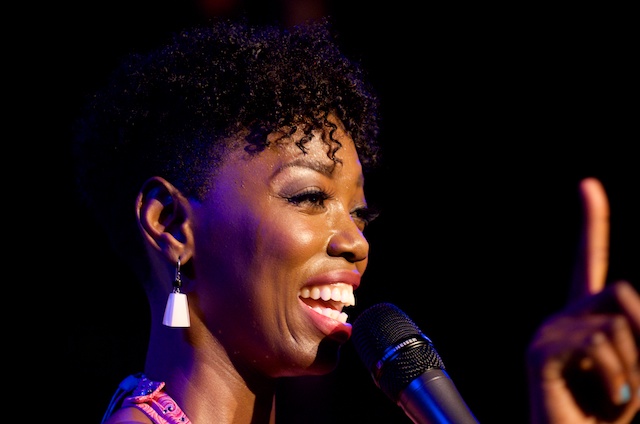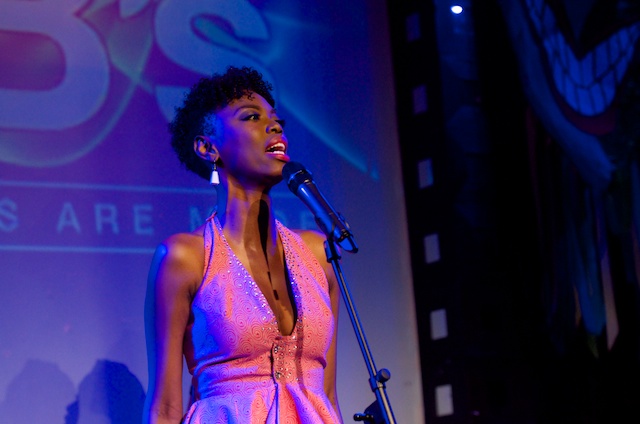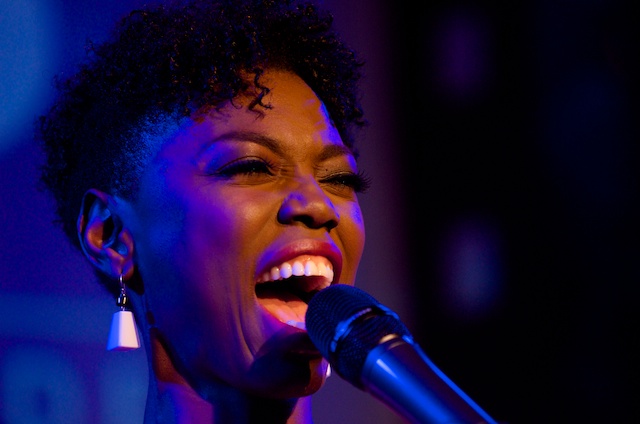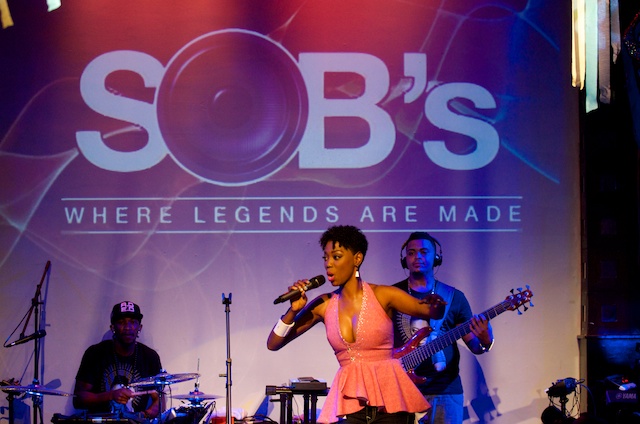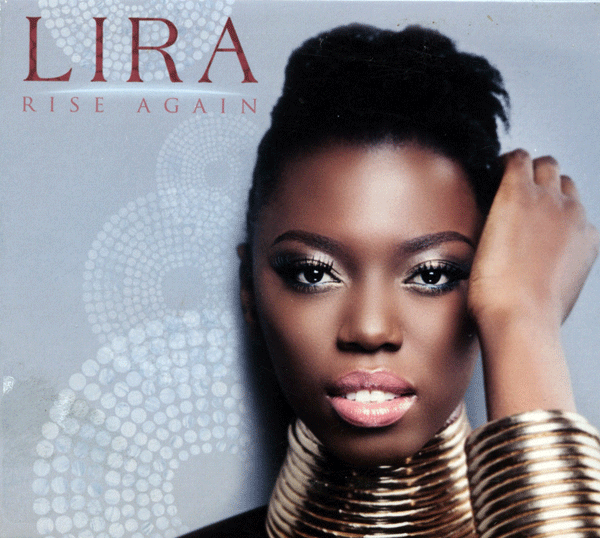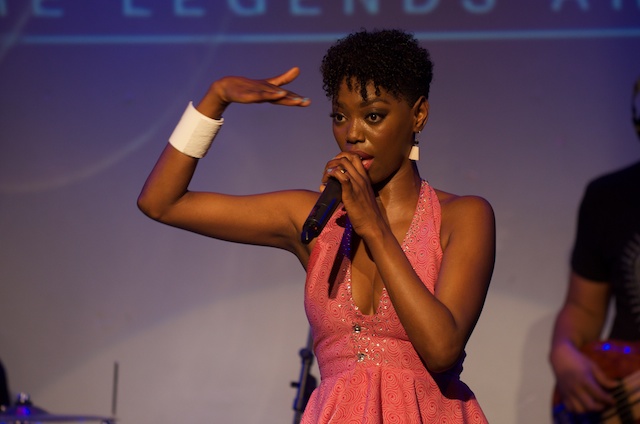Lira is a young rising star from South Africa. Afropop’s Banning Eyre caught up with her on the eve of her second New York gig, a show at SOB’s last summer, to support her latest album Rise Again (Shanachie). The show proved two things: First, Lira has a bunch of adoring fans in New York. Second, she’s one of the most dynamic and engaging young performers to emerge from Africa in recent years. She's making another New York appearance at the AfrikCan celebration Sept. 19-20 at La Marina. Here’s her conversation with Afropop. Photos by Banning Eyre.
Banning Eyre: It's really nice to meet you! Why don't you start by introducing yourself?
Lira: Absolutely. My name is Lira [born Lerato Molapo] from South Africa. I'm a singer and songwriter. I've been in the industry for about 10 years, and I've had an amazing run--quite popular in Africa and in Europe.
Nice. Let's go back to the beginning. Talk a little bit about your childhood and how you got into music in the first place.
I grew up in South Africa in the time of apartheid, and music was always played, for as long as I can remember. And interestingly, there was a lot of American soul music being played. So you heard Stevie Wonder, Luther Vandross, Nina Simone, Aretha Franklin, cranking through the streets. There was a lot of that going around. And growing up in apartheid, there was a lot of strife going around as well, but music seemed to offer people an escape. And, with our family in particular, music had the power to unite people. It's amazing how we would dance with our uncles and aunts, and it just formed such fond memories for me. But from a young age I was aware of the power of music in how it transformed people's emotions and moods. I felt music articulated what people were feeling, but they couldn't express themselves. And I wanted to be able to do that. I wanted to be able to write the kinds of songs that would have that effect on people, and that's always what I've been striving to do.
So you mentioned some of these r&b and soul singers. I remember, actually we went there in '88. We had a fun experience, because it was right after Paul Simon’s Graceland, right? So we went there expecting to hear music like Graceland. We went to big festivals, Spoleto and Atteridgeville and places like that. We heard what was really happening. We heard the beginnings of kwaito music. And we heard Lucky Dube, who was just emerging at the time. It was kind of a surprise for us, but we got a taste of the musical milieu that you were coming of age in.
Very much, yeah.
You mentioned a few, but tell us some of the other singers who inspired you, whether they're from abroad or South African.
Stevie Wonder in particular made me want to become a songwriter. I understood his words, and I found him so inspiring. I remember when I was going through my own struggles, when I was getting older, and I was asking some big questions. His music gave me a sense of hope. And that was just beautiful, that music could do that. I would be able to cry, and I felt like I was able to release pent-up emotions and frustrations. I just thought that was magical. I stated really writing my first few songs when I was 16. It was my last year of high school.
But the actual first song that I wrote was influenced by Mary J. Blige and Anita Baker. Just because they're female vocalists, and I just love the style of vocalizing. Admittedly, Brenda Fassie was a big influence, but she was more of a pop artist. I wouldn't say she influenced my songwriting and such, but it was exciting to see us have such a big music star that we could call our own. She was really really exciting. But then there I was. I wrote my first song, and it had an r&b flavor. I was trying to tell a love story, although I hadn't been in relationships myself, I used my imagination to express what I felt it would be like. But I feel that from the beginning, I was always trying to capture emotion, to put words and melodies to people's emotions.
That's interesting: Stevie Wonder. Stevie Wonder was the soundtrack to life when I was in high school, too. But you say you wrote your first song at 16. When did you start performing and organizing a band and things like that?
At 16 I did so much in one year. I decided: I'm going to write a song. Wrote the song. Then there was an opportunity to enter a talent show, so I teamed up with a friend of mine. We used to sing a lot of a cappella songs together. So we sang just voices at this talent show, then we won best vocalist, best performance, best composition. All in one year. And then with that win, we had opportunities to perform in different spaces for young and old, all kinds of races. And for the first time, I saw how my own music had the power to connect with different races. In those spaces it didn't matter that I was black. It didn't matter that I was young. It didn't matter that I was female. It was just beautiful music. And it gave me a taste and the possibility of freedom, I think.
What year was that?
This was '95.
'95. So that was just after Mandela was elected.
Yes. It was a very exciting time. And two years prior to that was the first time black people and white people were allowed to go into the same schools. So there was a lot going on. You can imagine, suddenly I'm standing on stage and I'm singing for white people, Indian people, black people, old or young--it was just magical what music could do. I thought it was a magical energy, and I fell in love with it. I just felt that it would open doors, of experience if nothing else. And that's what I was appreciative of. And so in that one year, all of this stuff happened, and I decided: perhaps this is something I could do for a living. Only nobody encouraged me to pursue music as a career.
Nobody in your family, or even in the industry?
Nobody. I was told, "Nobody sings for a living. Don't bother. That's what you do as a hobby. You don't pursue music as a career." So, I was like, "OK, cool. That's my hobby. No problem. I'll just do that." And instead, I pursued a career in finance. And that's just because that was my favorite subject. I was very good at accounting. And I worked in an accounting environment for two years.
Until I couldn't do it anymore. I was like, "There has to be much more to life than this." I actually felt unfulfilled, and then I had to define what fulfillment is to me. If having a solid job and a great income isn't fulfillment, then what is? So I was like, "Well, the last time I felt like I really felt alive was when I was on stage singing. So I'm going to try and go that avenue and try and find fulfillment that way." So I devised a five-year plan as to how I was going to do this.
You used your finance background.
Exactly. I was like, "I'm going to account for this five years." So the plan was then to say: "This is what I want to do. This is how I'm going to spend these five years." And I quit my job. And I decided this is what I was going to do. My parents were initially against it, but my mom could see how unhappy I was in the current job I was in, and what I told her was, "Well. I'm not doing it forever. I'm just going to take five years off. And then by the time I'm done, I'll be 27, so that's still young enough to get back to reality." And that was a decision I made 13 years ago. I haven't looked back. It's been a wonderful journey.
Now, was that in Joburg? I know you were born outside the city, but when you had the job and the experience at 16, that's all in Joburg?
It was in Joburg, and then when I worked for the head office of my company, it wasn’t too far from where I grew up, actually. About 10 kilometers outside of Joburg.
So you made this decision that now you're going to go back to music, and it's really going to be serious. Did you form a band, or get a manager? How did you go about it?
Firstly, I had to consider the resources that I had available to me and what was happening in the music scene at that time. There was one particular label that produced soul r&b acts at the time, because it wasn't really popular.
What was it called?
Ghetto Ruff. And what was curious for me is that we were consuming a lot of soul r&b, just not our own. We were consuming a lot of it from the States. And I was like, "Why can't we tell our own stories in that vein? That's what I want to do." But there wasn't a lot of that going on. All ready I had chosen something that was unconventional. And I remember being told, "You're not going to go anywhere singing positive music. You need to show some skin, get sexy on stage, and you'll be successful."
This was the era of kwaito.
Exactly. It was raunchy. It was raunchy. And that was all good and well, because that was the popular culture at the time, and that was fine. But I knew that was not me. I was frustrated initially.
People tried to steer you in that direction.
People tried to do that. And what was interesting was that the label that actually gave me my first break was a kwaito stable [999 Music]. But the reason I signed up with them was because they felt that they were... the label head at that time was referred to as the King of Kwaito. And it was like, "Ugh. You know, I've got this kwaito thing down, now I want to go into soul r&b." I was like, "Yay. Fantastic opportunity."
So we met at a time when he wanted to go into soul r&b, and he [Arthur Mafokate] had all the resources, so it was a great opportunity. And I was a singer/songwriter, and I could even produce my own material. So it was a perfect combination. However, as soon as I got into the label, I was completely sidelined. They were focusing on everything that was kwaito because it was easy money. If you're going to go into soul r&b, you would have to develop that and create the platform for that. And it was just too much work.
This was incredibly frustrating, because I had a five-year plan, and I wasted two years of my time in that space. So I was angry. I was broke. When I quit my job, I had enough money to survive for a year. Because I figured that a year was enough time for anyone to get themselves on their feet. Not my story at the time. So I was angry. I felt like a failure. So many crazy emotions went through me. But eventually the first album came out, and, even for that to happen, I had to time in a time where the kwaito scene was sort of quiet. And that's during the January months. So I walked into the office, I stormed in, and I said, "You will record my album. I am ready. Let's go do this." I recorded the album, and it came out May 2003.
This is with that same label?
With the same label. And that's the first single that kicked Beyoncé’s "Dangerously in Love" off the number two position at the time, off the South African Billboard. No other South African act at that time had ever received that much airplay. Ever.
So this was a wake up call.
So that was a big deal.
What was the song? Tell me about the song.
"All My Love." When I listen to it back, that's the song that had the influence of Mary J. Blige and Anita Baker. I was listening to a lot of that, and I just loved those two artists, and I couldn't help but bring a little bit of that. That was "All My Love." I was getting crazy airplay, but it was so badly marketed that nobody knew that I was South African. It was frustrating for me.
So even South Africans thought that they were hearing someone from abroad?
Yeah. Just because the quality was actually of that standard. It was quite frustrating. Also, we could not accept that our own music could be that good at that time. Again, perceptions. Then I felt me being in a kwaito stable negates what I'm trying to do. People still didn't know who I was, even though I had seven singles getting crazy airplay. But people just didn't make that association. And that was lack of marketing at that time.
It was all from that first record? Seven singles.
Yeah.
So it was getting the great airplay. Somebody must be noticing this.
The interesting thing is, you have artists here that are sort of just artists doing their thing. They're probably doing as well as I am here in the States. But in South Africa, they're huge because they're getting so much airplay. And that's normal. So we have all of this music being played, and what happens is: sometimes they put all of this music into compilations. So sometimes you might not have a whole album, but you'll be aware of artists from here that aren't necessarily doing as well over here in the States, which is quite interesting. And I would never know that unless I came here.
So that's just the lay of the land. For me, it was like, "OK. So now what do I do?" It became necessary to remove myself from that stable, and the question was, "How was I going to do this?" Just going independent, resources... it's all very difficult. I remember buying my music from the record label, or rather from the distributor and walking up to music stores and going, "Please, will you sell my music? I've got posters, I've got everything." And they would laugh at me and go, "No, we don't work that way." I was so frustrated. I just felt that everywhere I went, the doors were just being shut in my face. It's because I didn't know the system.
So I was like, "OK. Let me rather focus on what I can do, rather than getting depressed over what I can't do.” I looked for opportunities to perform. I've got all of these CDs, I might as well perform and sell my music live. And I've been doing that I think for the last 11 years. I got used to that. I do a performance... Sometimes I'd make more on what I've sold in CDs than on the actual gigs. I'll perform anywhere, everywhere.
And for three years, I became a fully fledged working musician. I hired a band. I bought equipment. I was my own booking agent, and I was an artist as well. So, I was very admin-savvy, coming from an accounting background and having worked in a corporate environment. I started paying myself a salary, because I recognized that we started eating... As musicians, you survive from hand to mouth. So I would apportion my income. I literally would say, "Save 10 percent for marketing." Because you just never know. Ten percent would be for savings. And I'd pay myself just enough to survive. And I would literally learn to work, to do my best, with little. And I've continued these habits. It doesn't matter whether I'm earning a fortune or just enough. Those habits I’ve carried on.
So there are always reserves. There's always money for marketing. There's always money for development. And I love that. As a result, I've developed a formula that any musician can use to survive the nature of our industry.
That's very interesting. You're definitely ahead of your time, because everywhere we go now, we hear about how music has become this kind of do-it-yourself thing. You know, labels are fading out. All the old structures are fading out, so if you can't do it yourself, you're in trouble. But you were ahead of that one.
It was necessary at the time, but it gave me such empowerment. By the time I signed with Sony Africa--
And when was that?
That was in 2006. They trusted me. I was so organized. I presented my whole thing, how I wanted to be presented in the market. I offered a marketing plan for my album. I identified my audience. I was just so organized that it became a partnership rather than a person saying, "OK. You're Lira. You need to do that. You need to shop here." That kind of thing. It became a collaboration. And I loved that. I loved being that empowered.
So I had a lot of control over my career, to a large degree. I controlled my publishing. Just because of that one bad experience... I'm actually grateful for it now, because it taught me how to be responsible for my career.
So that was the second album? And what was it called?
It was Feel Good, actually. So that was the first time Feel Good came out. And then I released Soul & Mind and Return to Love. And then I also released two live DVDs. The first one became the highest-selling DVD of all time. And before then, Celine Dion was the highest DVD of all time in Africa. I mean madness. Madness. So it was nice to reclaim my territory.
By now you had some respect.
Very much. Very much.
And so how did this change your performing career. What time of opportunities came into play after that?
South Africa is a very interesting space. A lot of artists survive off of festivals. So I played that space, you know. Now I was an artist who was worthy of being invited to the big festivals. And then I decided that I don't want to be told, "Perform for half an hour." Or for 45 minutes. My fans want to get a whole experience, and I want to be able to tell a whole story. So I'm going to have my own concerts. And when I recorded my first DVD, that's actually what I was doing. I decided to book an arena in my hometown. Not too far from my hometown. My district.
I was going to do this my way. I'm going to have a two-hour concert, and I'm going to do it my way. And nobody had ever done that before. And we sold out. And I was afraid thinking, "People are so used to paying a fee to see like 12 artists over a whole day." You don't come to a concert to see just one artist. Only a few very refined, older artists can do that. And even then, you'll have maybe two or three people performing at a time. So even that was risky on its own. But I really wanted to be able to create an experience. And I did it. And then it became a trend, which was incredible as well, to be able to champion that. And that's how I got called "Africa's Beyoncé."
Because, when I did the first one, I was like, "Well, why stop here?" What else can we do? I started having fun with live performances. The one tour that I did, I hired 100 people. For me that was powerful. I loved that. I love that I've been able to develop my career to that level where I could do that. There were 50 people going on tour with me, and, on the day that we shot the last leg of the tour, we were at the Superbowl, and there were 6,000 people over two nights, and we recorded it with 100 people hired. I just had so much pride in that.
So, for me, whenever I do something phenomenal, and I feel like I've figured out how to do it, I like to share it with the industry, because it has to become the norm. We need to own our space. We need to own our career. We need to own our creativity. We need to know that it's possible. But what I've also realized that I've had to develop it, nurture it over time. And some artists aren't willing to do that.
I always say, "If you don't invest in yourself, who do you expect to do that?" But I learned a long time ago to save 10 percent of my income, so I could do exactly that. So that's how I was able to have resources to do that.
What year was that first two-hour concert that became a DVD?
2009.
And you say you wanted that to become the norm. Has it?
Oh, now it's a lot. Everybody's got a DVD out now. Everybody's... Yeah, now it's the norm. It makes me so proud. It really does. It makes me so proud, I can't even tell you. Everyone is just notching it up. Everyone is sort of upping their game, and as a result, somebody was tweeting the other day: Artists that have done stuff after I've done it are being named in the same sentence, or around the world. So, as a result, we're being noticed in other parts of the world. Our music is gaining popularity on the global stage, and that's exciting, because one of our biggest responsibilities as African artists is to show the world what modern Africa actually is. Because, what's been seen before isn't the case anymore. This is now.
There’s been a lot of misinformation.
Yes, misinformation. So now we have an opportunity to introduce the world to what Africa is right now, and the best way to get to know a culture is through our music and our fashion and our... Yeah, so for me, that's our responsibility. I'm excited by the idea of not just me coming up, but it's a group thing.
So, with all that as background, what's the story of the new record Rise Again?
Rise Again is a collection of songs from the last three albums that I released in South Africa. And it's an introductory album for me in the United States. I feel this collection best reflects who I am and who I've become and the values contained in my music. I sing about love, inspiration and self-acceptance. And, of course, I celebrate being African.
These are the messages I feel that anyone in any part of the world can resonate with. And I think predominantly, even coming to the states for me was in response of fans that were emailing us through Twitter and Facebook saying, "Please, you have to come to the States. Where can I find your music?" For me, I just want to share my music. So, when I saw that interest, I was like, "OK, let's go check it out!" And that's why I came here in 2011, and I did a mini-tour. To get a feel for it. Because, I'm not willing to compromise on my messages in my music, and that's often everyone's concern. "Oh no! Don't let them change you!" No. It comes from the heart, in my core. So I was like, "Let's get a feel for how the American market will respond."
And it was phenomenal. That tour, we sold out every single venue, and I was just blown away. And they were just interested. They loved the messages, the African songs. Of course, America is a very America-centric country. But I've found that people who were coming to my concerts were interested in the story of growing up in South Africa, how the music came about. They were just generally interested. And they connect with it. And that's what music does. Ultimately, I'm just looking for that connection. And so far, it's really going really, really well.
So, you sold out all those concerts. How did those people know about you?
Some of it was completely random. Some people would say, "Oh, my friends and I were free, and we thought we'd come check it out." And they'd say, "I didn't even know there was a performance. We were just looking for a place to hang out." So in a room filled with, say, 200 people, maybe 10 would know. And the rest would just... "I was just in the neighborhood," or, "This was just by chance," or, "I heard you on the radio. You know, I don't even know who you are." And even on this particular trip, it's the same thing. And that's lovely, because it's those connections. And that grows. That's how I grew my career in South Africa. It's been that organic. If a person resonates with it, you trust that. To make the music grow.
Let’s talk about a few of the songs.
OK. Let me start with "(Something Inside) So Strong". That's the only song I haven't written in this entire album, and it was written by Labi Siffre in the 1980s, when he saw the plight of native South Africans. I re-recorded it in honor of Nelson Mandela, for his birthday in 2010, because I found out that it was one of his favorite songs when he was incarcerated. Such an amazing, powerful song. It really celebrates the power of the human spirit. As a result, it's become one of the biggest tracks I've ever recorded. When I perform it, I... It's just powerful. Absolutely. I wish I'd written it, but I couldn't have done a better job myself.
That's the song that has a large chorus of voices?
Indeed, with the choir. I recorded it with the Soweto Spiritual Singers, because they were also signed with Sony. They also toured the world. Such a great privilege to be able to sing in honor of Nelson Mandela. And, like I said, people just love the song. It's so unifying. It really just speaks of the spirit that we all have that connects us all.
And then, "Feel Good," I wrote in the time I was just pissed off with the industry, and just how my life had turned out, and how my five-year plan was not coming all right. I suffered a bit of depression, because I just felt so sorry for myself, you know? I shouldn't have left my job, and I was just going through that whole phase. And I wrote the song... It was like a fervent request to say, "I just really, really want to feel good. Every day. I want to feel the joys of the day. I want to feel the newness of a brand new day." I don't want the days to start jelling together, that this misery is just like a constant in my life. And, it was just like this earnest request to feel better about life.
And it's amazing, once you sing about, you bring about, I think. "Rise Again"... again, reflecting on my own journey that I realized: Life is a cycle. So you'll go through the lows, but that's not permanent. It's to remember that when you go through the lows, it comes up again. And to remember to not spend all your energy on the times that you feel low. To really just hang on, because it really does get better. Just to remember, like a note to self, to say, "Things do get better." And often, when you're going through that dip, it's because you need that lesson, or you need to change direction, or you need to slow down. So, it's OK. Just hang on, things will get better.
"Hamba" is another favorite of mine. Hamba means "Go." "You can go."
In what language?
In Zulu. It's a beautiful love song, but a sad love song. It's a woman who is really fed up with being in love with a man who does not treat her well. She basically says, "I might love you, but I'm ready for you to go, because this is no longer healthy for me." And I just love the Zulu language, because there's depth in some of their expressions that doesn't exist in the English language. And it just expresses a fatigue with the situation, the little nuances that the language has. I just put them in there.
The other two songs that are not in English, those are also in Zulu?
Yes, yes.
I remember Johnny Clegg, years ago, telling me that Zulu was such a great singing language, because it's all short syllables with vowel-consonant-vowel-consonant, so it's really easy to make a rhythm happen in your lines.
That's actually interesting. You see, being a Caucasian, he would process it from the code of his language.
Yeah, of course.
So, I wouldn't have picked up those... I wouldn't say that. I had to learn English. So my perspective is a little different. So that's interesting. That's actually very interesting.
But go ahead, continue. This is great.
“Ixesha,” one of my favorites. That's actually Xhosa. And Nelson Mandela is Xhosa, as well. And my mom is half Sotho, half Zulu. The other language I sing in is Sotho, but I didn't include any Sotho songs in this particular album.
“Ixesha,” is the Xhosa word for "time." I just love the Xhosa language. Miriam Makeba used to sing in Xhosa, with all the clicks. And it's a sexy language. It's got so much attitude. It's a really fun language. And "Believer" is one of my favorite compositions. I was trying to capture what I believe in at my core without being too deep. Or too religious for that matter. Because I'm not religious at all, but it's quite a spiritual song. But I knew that if I say "believer," people will automatically think it's a gospel song.
But it's not. What it is was me talking about my belief in love. I remember people would say, "Oh, you need to believe in yourself." And now, somebody that hasn't grown up speaking English, I would sit there and go, "OK. So, if I walk out of this room, and I believe in myself, what does that look like? What am I actually doing? Physically, practically, what am I actually doing?" Nobody could answer that for me.
And, in the song, when I broke it down for myself, what reflects what you believe in is the consistency in your thoughts, your words and your deeds. If those things are aligned, you know what you believe in. So, whatever you believe in, you will do, you will think about, and you will speak about. And, when those things are disconnected, you can't say you believe in the thing, because it doesn't reflect on those three levels.
So, with “Believer,” I do believe in love—as a verb. Not as some airy-fairy feeling. As a verb. As something you do, you think and you speak. And I put that out there, and I just love the song. It's one of those... I even crank it up in my car. Absolutely love it.
Wow, that's great. Excellent introduction to the album. Let's talk a little bit about this tour. You brought your own band. How many musicians did you bring?
My band is a four-piece, but we're a crew of eight people. So I've got a lovely videographer from Atlanta. The rest of the team is South African. So, my manager and sound engineer. And then I've got an assistant. Sound guy, who is also a videographer, Jonathan. And then my four pieces: keys, bass, guitar and drums. And that's the band. They call themselves the "Love Band," of course.
Well, I'm really looking forward to the show. Maybe we could just look at the future a little bit. What’s your next five-year plan?
It's a global career, really. I want to be able to release music instantly throughout the world and know that I can tour the world. The more I'm able to share my music and my message around the world, the happier I am. I seem to care less about the superstar craziness of this industry. I just love music, and I love being able to perform it live and connect with people from different cultures and different parts of the world. I love connecting with human beings and hearing people's stories and their strife and their struggles. And, interestingly, although my music is influenced by my South African experience, I realize that we all have the same kind of struggles, just my background was South African apartheid.
But, ultimately, we have the same struggles. We all are trying to find our place and space in this world. We're trying to express ourselves. We're trying to do what we love. We're trying to be happy. So I feel the music will connect on that level. And I want no limits.
That sounds great. Well, good luck.
Thank you!








